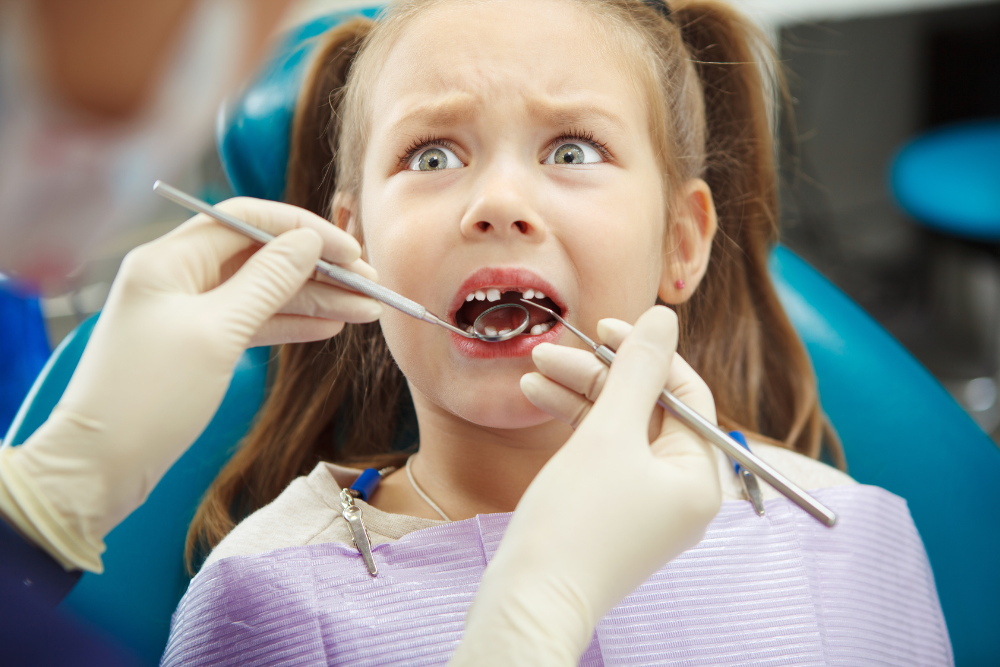It’s quite natural for a youngster to feel scared while visiting the dentist for the first time, or even the first several times if there have been large gaps between appointments. It’s a bizarre setting, with devices strewn around and others wanting to see into their mouth. Adults, too, may be anxious about it! Along the road, we’ve picked up a few pointers for things you can do at home if your kid is afraid of the dentist. Here are some wonderful tips for reducing dental fear in children and making Children Dental Center Indianapolis IN appointments easier for both of you:
Go To the Dentist When You’re A Child
According to the American Academy of Pediatric Dentistry, children should receive their first dental checkup when they obtain their first tooth or later than their first birthday. The first visit is generally brief and focused on gathering information. We can offer you input on things like thumb sucking and pacifier usage and check to see whether your child’s teeth are cavity-free and growing in properly. Most importantly, it helps your kid connect with the dentist and get familiar with the workplace, allowing them to feel at ease. Over time, we gradually expose children to things like dental equipment, which reduces their nervousness. By the time your kid is a toddler, going to the Childrens Dentist Indianapolis IN will be second nature, and they’ll be prepared. If your kid is a toddler or even a school-aged child and has not yet had a check-up, the sooner you can arrange one, the better.
Careful Planning Is Essential.
Sometimes a kid’s dental fear isn’t genuinely dental anxiety but rather the outcome of a youngster being confronted with a new situation when sleepy, hungry, or overstimulated. Schedule your appointment when your child is most cooperative and happy, such as after a daily nap or in the morning after a full night’s sleep and a healthy meal.
Visit A Pediatric Dentist (Preferably One You Will Enjoy!)
Pediatric dentists treat children and teenagers, and people with specific needs. Pediatric dentists get two to three years of extra training after dental school. They study not only children’s oral health but also child development and psychology, allowing them to converse successfully with young patients.
Discuss The Dentist and Oral Health With Them.
It’s a good idea to talk to your kid about why it’s so essential to look after our teeth, the function of the teeth and gums, and how the tooth doctor can assist regularly. In terms of visits, we wouldn’t inform a child they’re going to the dentist months in advance because kids have vivid imaginations and, given enough time to think about it, they may conjure up some terrifying scenarios. Instead, talk about it a few days before your first visit to the Kids Dentist Indianapolis IN or whenever. Don’t get bogged down in the details. Tell them what to anticipate in a few simple words that they can grasp, and then answer their questions. Keep it short and sweet, and avoid using “shooting” or “pain.”
Be an Excellent Role Model
Even if you despise going to the dentist, make an effort not to show it. According to research, adults may pass on their dental concerns to their children. If you have a root canal planned with your dentist, don’t bring it up in front of your children or express your anxiety. Instead, spread happy sentiments and speak about the dentist favourably. When you take your kid to the Pediatric Dentist Indianapolis IN, try to seem as comfortable and pleasant as possible.
Read Books or Watch Videos About Dentists.
Reading books about the event might help your youngster prepare for their visit to the dentist. They may find out how their favourite characters had a great time at the dentist and discover that nothing goes wrong during checks. Just Going to the Dentist by Mercer Mayer, What to Expect When You Go to the Dentist by Laura Rader, Dentist Trip (Peppa Pig) by Scholastic, and Dentist Trip (Peppa Pig) by Scholastic are a few of our faves. Curious H.A. Rey and The Berenstain Bears’ George Visits the Dentist Stan and Jan Berenstain’s “Visit the Dentist” Fillings are mentioned in a few of these titles. You know your child well, so skip that section or build up your tale to explain what’s happening in the photographs if it’s their first visit. Many films on YouTube also focus on addressing children’s anxieties about the dentist and deconstructing what occurs during the first appointment that you can find with a short search.
Re-inform In a Positive Manner
We don’t mean bribing kids or giving them sweets if they make it through a dentist appointment without weeping or wriggling. This strategy will make kids question what’s wrong with the dentist that you’re expecting them to weep and squirm over. If your child is afraid of the dentist, congratulate them for being courageous and taking the first step toward a healthy smile after their session. Remind them of what they performed well throughout their visit and instill some pleasant and fuzzy sensations that they’ll associate with overcoming their concerns.
If anything goes wrong during the appointment, such as your kid refusing to open their mouth at the dentist, crying, or refusing to sit in the chair, resist the desire to chastise them. Keep cool and remember that pediatric dentists deal with children regularly and are accustomed to seeing a variety of emotions from them when they’re terrified. Discuss why they behaved out after the visit and what efforts you can take together to avoid it from occurring again next time.
These suggestions are intended to alleviate youngsters’ common worries and concerns regarding dental appointments. Dental fear in children, on the other hand, is more severe. A phobia is a persistent fear that causes avoidance and is out of proportion to the circumstances. True dental fear in youngsters is uncommon, although it may occur. If your attempts to help your kid overcome anxiety have failed and the fear seems severe, get assistance from your pediatric dentist. Sedation dentistry or seeing a child psychologist may be an option in certain situations of dental fear in children.



